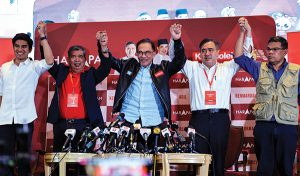Bloomberg
Veteran opposition leader Anwar Ibrahim, who has come tantalizingly close to leading Malaysia during his tumultuous political career, is suddenly on the cusp of clinching the top job —but a final hurdle stands in his way.
Anwar’s reformist coalition won 82 parliamentary seats in Saturday’s election, the biggest haul among the competing blocs. While it’s short of the majority needed to form a government, it puts him in prime position to forge an alliance to do so. The only catch? The 75-year-old politician may have to do a controversial deal with his longtime nemesis.
Anwar and his main rival are in a race to secure enough support from other parties after elections over the weekend resulted in a hung parliament for the first time in Malaysian history. Both Anwar and former Prime Minister Muhyuddin Yassin have claimed to have wooed enough lawmakers to form a government. Party leaders have until Tuesday afternoon to inform the nation’s monarch of their choice of prime minister and the alliances they have formed.
Barisan Nasional, the pro-Malay coalition that has ruled Malaysia almost without interruption since independence in 1957, finds itself in the unlikely position of kingmaker after a washout performance left it far short of forming a government but with enough seats to tip the balance to decide who does.
Anwar said Monday he was optimistic of heading a coalition government with BN and was now awaiting a formal decision from the former ruling bloc.
But cutting a deal with BN, which has the United Malays National Organisation as its linchpin, may meet resistance in the self-styled reformer Anwar’s own camp. In a messy campaign characterized by race and religion — part of a long tradition of identity politics in Malaysia — Anwar’s multiracial Pakatan Harapan coalition found little in common with its staunchly pro-Malay counterparts.
“It would be difficult as Anwar may alienate his own party members,†said Asrul Hadi Abdullah, deputy managing director of advisory firm BowerGroupAsia.
In a political culture dominated by personalities and loosely built alliances, no eventuality can be ruled out as the horse-trading continues over securing a majority. The quesition now is whether Anwar can get an alliance with BN over the line without angering his coalition partners and voters in urban areas.
Former premier Muhyiddin, whose Perikatan Nasional coalition won 73 seats, had already ruled out working with Anwar. Anwar’s Pakatan Harapan campaigned on addressing the rising cost of living, capitalizing on growing anxiety about the country’s already fragile economy. The coalition also committed to undertaking key reforms, from introducing greater separation of powers to regulating political funding. It took a hard line on corruption, lobbying for financial transparency among civil servants.
Muhyiddin, who led Malaysia during the Covid-19 pandemic, and PN pledged to establish an anti-corruption unit, but also focused on other issues, including youth representation in government, digital access in schools and greater incentives for gig workers.
Becoming prime minister would be a defining moment in Anwar’s decades-long political career. He was in line to take over as prime minister from Mahathir Mohamad after the two joined together to win the 2018 election, ousting BN after six decades in power. Yet Mahathir repeatedly delayed the handover, creating divisions within the ruling bloc and eventually leading to its collapse.
 The Gulf Time Newspaper One of the finest business newspapers in the UAE brought to you by our professional writers and editors.
The Gulf Time Newspaper One of the finest business newspapers in the UAE brought to you by our professional writers and editors.
